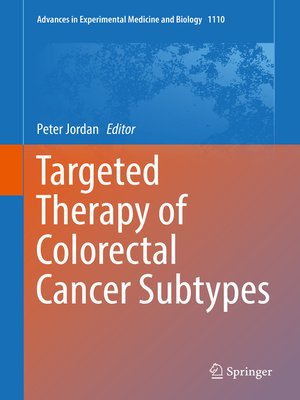Targeted Therapy of Colorectal Cancer Subtypes
ebook ∣ Advances in Experimental Medicine and Biology
By Peter Jordan

Sign up to save your library
With an OverDrive account, you can save your favorite libraries for at-a-glance information about availability. Find out more about OverDrive accounts.
Find this title in Libby, the library reading app by OverDrive.



Search for a digital library with this title
Title found at these libraries:
| Loading... |
Colorectal cancer (CRC) is a leading cause of cancer-related death worldwide. Recent years have increased significantly our understanding of the genetic alterations that can underlie CRC, but also unraveled the molecular heterogeneity of the disease. Although a simple correlation between genetic pathways, histopathological features and clinical outcome cannot be established, the heterogeneity of CRC is also an opportunity for the development of targeted therapeutic approaches, able to treat an individual tumor with higher efficiency and less toxic side effects. One CRC subtype is characterized by high mutation rates (MSI-H), DNA methylation changes (CIMP-H), mutation in the BRAF oncogene and occurrence of serrated adenomas in the proximal colon. Other groups prevail in the distal colon and consist of either adenomatous polyps with chromosomal aberrations (CIN) and WNT pathway activation, or carry frequent KRAS mutation and metabolic deregulation, or have strong mesenchymal andinfiltrative characteristics. Characterization of driver-mutation events in these CRC subgroups has led to the development of specific drugs targeting, for example, the MAPK pathway, but initial clinical trials have revealed unexpected response rates.
The collection of chapters in this volume address the biology of specific CRC subtypes and how these may be targeted to improve precision therapy and clinical benefit for the patients.






